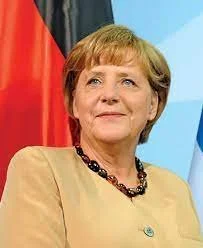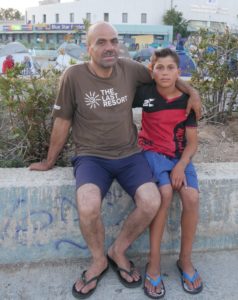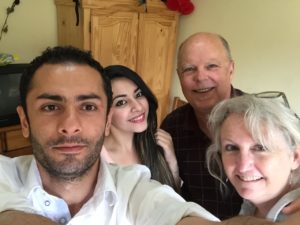She was born in East Germany to a pastor in training and a Latin and English teacher. For 35 years she lived in Soviet-controlled East Germany, even being asked at one point as a Young Pioneer to become an informant for the Stasi, the East German Ministry for State Security…
Diary of a Syrian Refugee
When my wife Becky and I were in Europe last summer, we followed the story of a number of the refugees we met in Greece, to Germany, where many of them had loved ones waiting for them. One of these was a young Syrian woman, who is engaged to a young man we befriended in Athens. We set out to visit her and arrived at the refugee center, a simple but clean apartment complex in the Berlin suburbs, and a pleasant looking man in his thirties came to greet us in the lobby. He turned out to be the young lady’s uncle, and was the only member of the family who spoke English.
We spent the next two hours visiting with both of them, and were joined about halfway through by her parents. Their hospitable and kind spirit was exactly what we had experienced in Greece in the camps. And when we left, I felt a strong connection especially with our interpreter, whom we’ll call Ali in this podcast, and had the impression that if I ever decided to get serious about learning Arabic, he would be a great teacher or mentor.
Well, it finally happened. Ali and I are now having weekly Skype conversations where he is answering all my questions that come up in my self-study. But I also asked Ali if he would be willing to let me interview him for this podcast. I had never heard his story of escape from Syria, where he would face almost certain death if he were to return now. I’d like to share with you here the unedited testimony of one Syrian who represents the hundreds of thousands who have fled their homeland in one of the greatest mass migrations of our time....
In our last Skype conversation, Ali told me he had just passed a round of German exams and is on to the next level. He hopes to eventually get a full time job, but is grateful for his part time job at the concert hall for now, as he carves out his new life in Germany.
Germany: Promised Land?
Becky and I continue our European odyssey by following the "refugee trail" from Greece to Germany, where so many of those in Greece have loved ones waiting for them. Our first stop was Berlin, where we had a couple of important errands: delivering hand written notes from their loved ones still stranded in Athens. You can read about that in this blog post.
We also met a singer-songwriter from New Zealand who lives in Berlin named Mathew James White(pictured at right with girlfriend Christine). Mat was invited to do a songwriting seminar this past spring. To his surprise, all but two of the participants ended up being refugees. By the end of their time together with Mat, they had written a song to thank Germany for taking them in. You can read about that on Mat's Facebook page in his post dated June 1.
In this podcast episode, you'll meet our friends Andreas and Anya Krause (pictured left), whose story tells of friendships that came from reaching out to a handful of some of the hundreds of thousands of recent arrivals in their nation of Germany. They also share many insights about being on the receiving end of such a huge influx of displaced people. I hope you enjoy their compelling stories.
Next week we come to you from Paris, where we take the pulse of the City of Lights seven months after the November 13 attacks.
Following the Stories to Berlin
If you've been following us the last few weeks, you know we had quite an eye-opening and moving time in Athens, Greece, where thousands of refugees are suspended in a sort of no man's land, hoping for a life where their own lives are not threatened. Most of them have lost friends or family members in one of the many conflicts in the Middle East; many have family members already waiting for them in Germany. Although we were there less than two weeks, we will not soon forget the warmth with which we were welcomed every time we visited one of the camps. Most of the people we met were Syrians, but there were also Afghanis, Iraqis, and Palestinians.
Since we were planning on Berlin as our next stop on this European odyssey, we offered to visit the fiancee of one young Palestinian man who grew up as a refugee in Syria. His fiancee is in Berlin with her family -- one of the few intact families we've met. We also arranged to visit the 17-year-old son of a Syrian father (pictured above) of nine in the Athens camp, who is in Greece with another son and two daughters while his wife and other children are scattered across Germany. (We still don't fully understand why family members are so often split up in different cities in their host country.) In this account, we are using made-up names to protect the identities of the people involved.
Adara, a 19-year-old Syrian girl with large brown eyes and long, beautiful hair, lives with her parents and two sisters in a plain apartment building in a southern suburb of Berlin. I had reached her father by phone to arrange the meeting, but he was away visiting his brother in the hospital when we arrived. After handing over my passport to the guard at the entrance to the shelter for asylum seekers, Becky and I waited until a young man in his thirties arrived to welcome us. With a kind manner and very good English, Abdul introduced himself as Adara's uncle. He took us to the family's small, no-frills apartment, where Adara greeted us at the door. She was not wearing a hijab (head scarf). Abdul and Adara led us to a bedroom, where we sat on twin beds facing each other, with a small table in between. This was the only room we saw in the apartment. But it was an apartment, complete with plumbing and electricity -- not a tent. Becky gave Adara the card written by her fiancé, Jalal, along with some chocolates and flowers we had picked up in Berlin. She fought back tears after reading Jalal's brief note, and went on to offer us glasses of water -- even though it was Ramadan, and neither she nor her uncle would have a drop of water or anything else until after sundown. She then brought us glasses of some kind of tasty grapefruit soda. (We've learned by now that it does no good to say no, thank you.)
We spent the next few minutes in a trilingual chat with the two of them -- speaking German to her and English to him, and he sometimes translating into Arabic for her. She was warm, poised, and gracious, just like all the other Syrian women we had met. She spoke of her intensive German language study, never letting on that this is probably the biggest ordeal she's ever been through. (Note: this week's podcast will include the aspect of German language learning as an important part of new immigrants' cultural integration.) Abdul, whom we took an immediate liking to, talked mainly about how grateful he was for the option of being safe in Germany.
After 30-45 minutes, Adara's parents arrived from the hospital. The dad was much larger in every way than his brother-in-law, Abdul -- more outspoken, more demonstrative -- a big teddy bear of a man. His wife was young-looking, all smiles, and wore the traditional hijab. Our time, by then, was unfortunately growing short, as we had to reach the opposite end of the city for our next appointment.
After photos, we said our goodbyes a little earlier than we would have liked, and headed back for the train station. I had set up our meeting with young Nabil with one of the social workers who staff the group home where he lives along with other under-age immigrants. It is a fairly nice-looking building in a quiet northern suburb, although we didn't see the inside. Not seeing a main entrance, I rang a buzzer and was answered by a male German voice, who said Nabil had gone out to run errands or do some shopping -- even though it was now the agreed upon time of our meeting. A little discouraged, we walked a few feet down the sidewalk and discovered an entrance we hadn't seen, and there was Nabil taking his bike out. Although his father had shown us a photo of him, we needed no photo to recognize him. He had much the same handsome face as his younger brother (pictured at the top) whom we had befriended in the Athens camp.
Nabil has been in Germany about a year, which means he was sixteen when his parents sent him ahead to find some kind of new life for himself, and hopefully his family would follow. This is an apparently common strategy. As we talked with this soft-spoken young man with broken German, I could only imagine what it was like to come to a completely foreign land as a sixteen-year-old, not speaking a word of the local language and entirely dependent on survival skills and the kindness -- or not -- of the German staffers who handled his case. It turned out that the staffer I had spoken to, a young man named Robin, who joined us a few minutes later, was indeed kind and works for a private nonprofit to integrate under-aged immigrant arrivals.
Nabil was reserved, and because both his German and mine were limited, our communication was not great. I was frankly not even sure he was glad to see us, although his father had told him to expect us. He did manage a weak smile from time to time. God alone knows what this young man has been through and the survival mechanisms he has had to put in place. As we parted ways after no more than half an hour of chatting and trying to understand more of his story, Becky and I came away with more questions than anything else. How long would it take for Nabil to be integrated into German culture? How long before he could be reunited with his mother in the eastern German city of Leipzig, not to mention his father and siblings still in Greece? Coming from a group-oriented culture and then left on his own for so long, how would his eventual reunion with his family go? No one knows. Again.
The refugee situation in Europe, and indeed on other continents such as North America, is so complex that it is pretty much impossible to get your mind around it. What we can get our minds around is stories -- stories of families and individuals whose lives have been permanently altered.
Stay tuned for the next post, where we share a song that captures much of this tumult and uncertainty, written by our son and his brother-in-law/bandmate.










